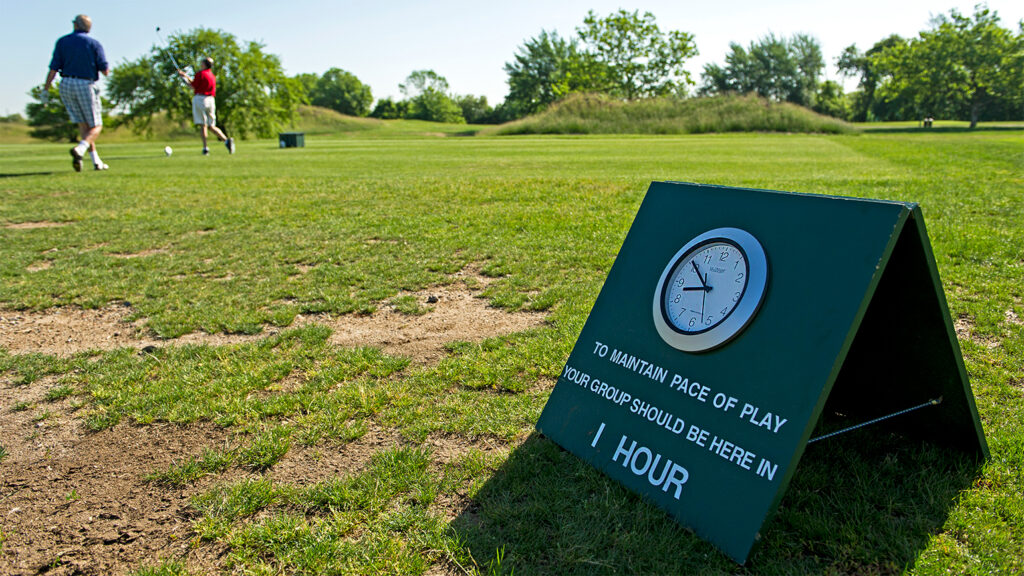
Golf Pace of Play: Tips for Keeping Up Without Rushing
Are you a golfer struggling to keep up with the pace of play on the course?
We will discuss the importance of maintaining a good pace while playing golf and the impacts of slow play on both golfers and golf courses.
Practical tips on how to keep up with the pace without feeling rushed and the consequences of falling behind will be provided.
Find out how golf courses can help improve pace of play for all players, whether you’re a seasoned pro or a beginner.
What is Golf Pace of Play?
Golf Pace of Play refers to the speed at which golfers complete their rounds on the course, encompassing both individual and group dynamics. It is not solely about playing faster but also about maintaining a respectful pace that ensures an enjoyable experience for all players.
Respecting others on the course involves being mindful of fellow golfers’ time and flow on the course. Following etiquette rules like being ready to play when it’s your turn, keeping up with the group ahead, and filling divots and fixing ball marks promptly contribute to a smoother pace of play.
Adapting to course conditions, such as being aware of busy periods and adjusting your game accordingly, can significantly impact how swiftly the round progresses. Effective group coordination, including communication on strategies or pace, aids in synchronizing efforts to maintain an optimal pace throughout the game.
Why is Golf Pace of Play Important?
Golf Pace of Play is crucial as it directly impacts the overall golfing experience for players. Maintaining an appropriate speed not only aligns with etiquette rules but also ensures that all golfers have an enjoyable round devoid of unnecessary delays and disruptions.
It is essential to acknowledge that a smooth pace of play plays a fundamental role in fostering positive group dynamics on the golf course. By adhering to designated time guidelines for each hole, players can create a cohesive and harmonious atmosphere within their group, promoting camaraderie and sportsmanship. Efficient pace not only benefits individual golfers but contributes to the collective enjoyment of the game, enhancing the overall experience for everyone involved. Proper pace of play reflects respect for the game’s traditions and etiquette, showcasing a player’s understanding and adherence to the core principles of golf.
What is the Impact of Slow Play on Golfers?
Slow play in golf can have a significant impact on golfers, leading to frustration due to excessive waiting times and disruptions in gameplay. It can also test one’s patience, especially for skilled players who prefer maintaining a steady and respectful pace.
For less experienced golfers, slow play can be an opportunity to fine-tune their game under pressure, but extended waits can still be bothersome. Respect for others’ time and pace is crucial on the golf course to ensure an enjoyable experience for everyone involved.
Perceptions of slow play can vary depending on skill level; some may view it as a chance to strategize, while others might find it tedious and hindering their performance.
What is the Impact of Slow Play on Golf Courses?
Slow play not only affects individual golfers but also has repercussions on golf courses. Excessive delays can disrupt course management, impact the flow of play, and create hazards that compromise the overall experience for players who value common courtesy and smooth rounds.
These challenges in course management often stem from groups falling behind due to slow play, leading to congestion on the course and potential conflicts between players. Hazards such as increased frustration, decreased enjoyment, and even damage to the course’s turf and reputation can arise from prolonged delays. Avoiding these issues is crucial to maintaining a respectful pace and enhancing the golfing environment for everyone involved.
How to Keep Up with Golf Pace of Play?
Keeping up with Golf Pace of Play requires a combination of effective time management, group coordination, and adherence to strategies that promote faster play. Respecting the pace set by others and employing ready golf principles can help ensure a smooth and efficient round.
One key aspect of maintaining pace on the golf course is being prepared before it’s your turn. Anticipate your shot while others are playing and have your club selection and yardage ready. This proactive approach not only saves time but also keeps the game flowing smoothly.
Communicating with your group members about strategies and pace preferences can help everyone stay on the same page. By respecting pace guidelines and being mindful of others’ time, you contribute to a positive golfing experience for all players on the course.
Be Prepared Before Your Round
Before starting your round, ensure you have booked appropriate tee times, familiarize yourself with course conditions, and adopt efficient play practices. Being prepared in advance sets a positive tone for maintaining pace and following proper golfing etiquette.
Booking tee times in advance not only secures your preferred slot but also helps in avoiding unnecessary waiting. Assessing the course conditions such as the layout, hazards, and green speeds can assist in strategizing your shots effectively. Implementing efficient play strategies like selecting the right club, focusing on consistent swings, and being mindful of pace of play can significantly enhance your overall golfing experience. Prioritizing respect for the course and fellow players by repairing divots, raking bunkers, and maintaining silence during shots contribute to a harmonious and enjoyable round.
Be Mindful of Your Group’s Pace
Monitor your group’s pace throughout the round, ensuring that all players are maintaining a respectful speed. Address any behavioral issues that may affect pace, and strive for continuous improvement in managing the flow of play to enhance the overall golfing experience.
Observing the group’s pace during a round of golf involves more than just individual players’ speed; it requires an understanding of group dynamics and how they impact the overall rhythm of the game. By paying attention to the interactions between players, you can preemptively address any potential slowdowns or disruptions.
Encouraging open communication and teamwork among group members can foster a harmonious pace that benefits everyone on the course. Remember, maintaining an appropriate pace not only ensures a smoother round but also creates a conducive environment for skill development and enjoyment of the game.
Limit Distractions
Minimize distractions on the course by staying focused on your game and avoiding unnecessary interruptions. Encourage your golfing partners to do the same, and adhere to etiquette guidelines that promote a conducive environment for maintaining pace and concentration.
Respecting the flow of the game not only benefits you but also contributes to a more enjoyable experience for everyone involved. Effective communication with your golfing companions can help in coordinating movements and decisions smoothly, reducing the chances of disruptions.
By emphasizing clear and concise interactions, you can ensure that conversations are relevant without derailing focus. Setting a positive tone from the beginning of the round can establish a shared understanding of the importance of concentration and pace, fostering a collaborative spirit on the course.
Use Proper Golf Etiquette
Adhere to proper golf etiquette to promote fair play, respect golf course norms, and avoid contributing to slow play issues. Following established etiquette guidelines ensures a harmonious and enjoyable golfing experience for all players on the course.
By showing consideration for others on the course, players can enhance the overall flow of the game and create a positive atmosphere.
Simple actions like repairing divots, raking bunkers, and keeping up with the pace of play help maintain the smooth progression of rounds.
Being mindful of noise levels, not disturbing fellow golfers during their shots, and being proactive in looking for lost balls without delaying play showcase good etiquette.
Embracing these principles cultivates a culture of mutual respect and sportsmanship, fostering an environment where golf can be enjoyed by everyone.
What are the Consequences of Not Keeping Up with Golf Pace of Play?
Failing to keep up with Golf Pace of Play can result in negative consequences that extend beyond personal frustration. Slowing down can disrupt other golfers’ games, lead to missed opportunities, and compromise the smooth flow of play that hinges on maintaining a courteous pace.
For other golfers, the frustration of waiting for slow players can easily build up, impacting their overall enjoyment of the game and potentially affecting their performance. Delays in play due to slow pace can result in missed chances to fully experience and appreciate the strategic aspects of the course. Upholding a courteous pace not only ensures that everyone on the course has a fair opportunity to play but also contributes to a more harmonious and uninterrupted round for all players involved.
Disrupting Other Golfers’ Games
Slow play can disrupt the rhythm and enjoyment of other golfers’ games, affecting group play dynamics and undermining the principles of fair play within the golfing community.
When one player consistently takes excessive time to execute shots, it not only slows down the entire group’s pace of play but also creates a sense of frustration among fellow golfers. This disruption can lead to decreased focus, which in turn impacts the quality of everyone’s game. In a sport where etiquette and respect for others are highly valued, slow play can strain relationships and diminish the camaraderie that is often a core aspect of the golfing experience. Addressing issues of slow play is crucial for maintaining a positive and inclusive atmosphere on the golf course.
Slowing Down the Entire Course
Individual play instances can have a cascading effect, slowing down the entire course and extending round durations. Implementing strategies for faster play at both individual and group levels is essential to prevent course-wide delays.
Players need to be mindful of their pace throughout each hole, ensuring they are ready to play when it’s their turn. Simple practices like pre-shot routines, prompt decision-making, and being ready to hit the ball without delay can significantly contribute to smoother play.
Course marshals play a crucial role in monitoring and managing pace, intervening when necessary to keep things moving efficiently. By instilling a culture of awareness and consideration among golfers, courses can maintain an optimal play for all players to enjoy.
Missing Out on Opportunities
By not keeping up with the pace of play, golfers risk missing out on valuable opportunities to enhance their golfing experience, maintain a respectful pace, and elevate their skill levels through consistent gameplay.
Playing at a respectful pace not only ensures a smooth flow on the course but also allows for better focus on each shot. This focused approach can aid in improving shot accuracy and decision-making.
When players adhere to pace guidelines based on their skill levels, they can make more informed club selections and strategize their shots effectively. By understanding their abilities and pacing themselves accordingly, golfers can progress steadily and make the most of their time on the course.
How Can Golf Courses Help with Pace of Play?
Golf courses play a pivotal role in managing pace of play by implementing strategies such as tee time spacing, enforcing course policies, and providing time management tips to enhance the overall flow of play and ensure a positive golfing experience for all players.
Tee time spacing is a critical aspect that can greatly impact the pace of play. By properly staggering tee times, golf courses can prevent congestion on the course, allowing each group to maintain a steady pace without feeling rushed or delayed.
In addition, enforcing policies related to player behavior, course etiquette, and ready golf can further streamline the playing process. By setting clear expectations and holding players accountable, courses can create a culture of respect and efficiency on the course.
Offering practical time management tips, such as keeping up with the group ahead, being prepared for each shot, and prioritizing continuous play, can significantly contribute to effective golf course management and a more enjoyable experience for all golfers.
Implementing Tee Time Spacing
Effective tee time spacing is crucial for optimizing group coordination and promoting fair play on the course. By strategically scheduling tee times, golf courses can ensure a balanced flow of players that minimizes congestion and delays.
This strategic approach not only helps in managing course traffic efficiently but also contributes to a harmonious playing environment. Adequately spaced tee times allow players to enjoy their round without feeling rushed or constantly waiting. It facilitates smoother transitions between holes, leading to improved pace of play. Such thoughtful planning enables golfers to focus on their game, enhancing their overall experience while upholding the principles of fairness and sportsmanship. In essence, a well-thought-out tee time schedule creates a positive domino effect that benefits all players on the course.
Offering Tips and Reminders to Players
Providing players with helpful tips and timely reminders on golf etiquette, maintaining a courteous pace, and enhancing skill development can contribute significantly to fostering a positive golfing environment and improving overall pace of play.
- By offering guidance on golf decorum, players can learn the importance of repairing divots, raking bunkers, and respecting playing partners.
- Reminding individuals about pace expectations helps ensure a smooth flow on the course for all participants.
- Emphasizing skill enhancement techniques, such as proper grip or alignment, aids in boosting performance and enjoyment.
This proactive support not only cultivates respect for the game but also creates a harmonious atmosphere where players can thrive and develop their abilities.
Enforcing Course Policies
Enforcing clear and consistent course policies is essential for maintaining golfing norms, promoting a respectful pace, and ensuring that all players adhere to the established guidelines that contribute to efficient and enjoyable rounds of golf.
Such policies not only help in preventing misunderstandings among players but also serve as a framework for fair play and sportsmanship on the course. By enforcing these rules consistently, golf course staff can create an environment where all participants feel valued and respected. Adherence to course policies aligns player behaviors with the expectations set by the management, leading to smoother operations and a more pleasant experience for everyone involved. Ultimately, upholding these regulations contributes to the overall integrity and reputation of the golf course as a place that values order, etiquette, and camaraderie among golfers.


